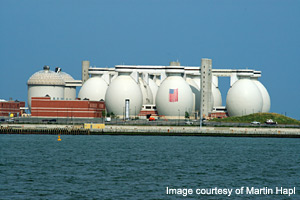
|
|
||||||||||||||||||||||||||||||||||||||||||
|
|
|
|||||||||||||||||||||||||||||||||||||||||
|
|
Infrastructure protection focuses on the nation's "backbone" systems and operations in the areas of communications, transportation, utilities, financial services, business, government, and public health. Those who specialize in infrastructure protection understand how each of these basic systems and operations work, and how they can be made more secure, reducing their vulnerability. Some develop plans to identify and respond to potential threats as well as how to restore functions during and after a crisis. Others work to implement these plans day-in and day-out, 24/7. For example, workers who are employed in financial information security protect all kinds of data - both digital and paper-based. Some have specialized backgrounds as computer scientists, database administrators, or networking managers, while others work in more general technical or administrative occupations as data-entry clerks, records managers, or administrative support specialists. Local, regional and state law enforcement agencies and the some private sector entities - such as those of the electric power industry - work to secure and protect vital facilities, resources, and operations. Throughout the entire U.S. economy, individuals employed in such diverse occupations as communications manager; information technology analyst; trucking dispatcher; utilities operator; or public health administrator also may have part-time, shared responsibilities for infrastructure protection within their businesses and industries.
At the federal level there are several departments with significant infrastructure protection responsibilities:
Federal, state, and local agencies plus many thousands of private businesses all have a stake in U.S. infrastructure protection. The nation's need for infrastructure security continually requires thousands of new, trained workers spread across many occupational fields. This trend will continue for years and decades to come. As a result, job and career opportunities are broad and varied across industries and occupations. Sources: U.S. Bureau of Labor Statistics (BLS); U.S. Department of Homeland Security (DHS); U.S. Department of Justice (DOJ); U.S. Department of Energy (DOE); U.S. Department of the Treasury; ASIS International Key LinksThe ASIS International 2005 report, Career Opportunities in Security, describes selected entry-level and mid-level security positions for a number of security fields, including several that are represented the Homeland Security industry. Additional information on careers and employment with the various agencies under the U.S. Department of Homeland Security (DHS) is available on the DHS Web site, specifically, the DHS - Homeland Security Careers. Information on career opportunities with other key Federal agencies is available through their Web sites as well: Careers in Homeland Security Report
|
|||||||||||||||||||||||||||||||||||||||||
|
|
[*]Home | About Us | Contact Us | Privacy & Security | Link To Us | Submit a Link Site Map | Promotional Materials | Partnerships | Freedom of Information Act 1-877-US-2JOBS (1-877-872-5627); TTY 1-877-889-5627 |
|










